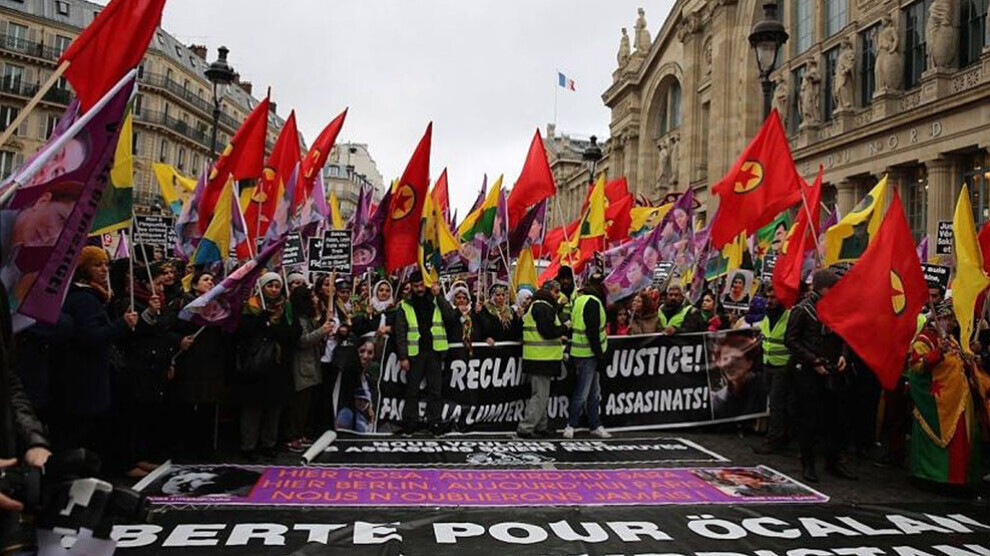On January 9, 2013, PKK founding member Sakine Cansız (Sara), Kurdistan National Congress (KNK) representative in Paris Fidan Doğan (Rojbin) and Leyla Şaylemez (Ronahi) from the Kurdish Youth Movement were assassinated by the Turkish intelligence agency MIT in Paris. On the occasion of the upcoming anniversary of the murders, the Executive Committee of the PKK issued a statement.
"On January 9, 2013, bullets were fired at the freedom of women embodied in the persons of our companions Sara, Rojbin and Ronahi. This was to stop the women's freedom movement and perpetuate the patriarchal mentality and politics,” said the PKK, describing the Paris killings as "one of the cruelest attacks of the 21st century".
"The Paris murders are AKP murders"
The PKK committee further said: "As is known, the murders of January 9 were murders by the AKP. Only 13 months earlier, the AKP had committed a massacre, the Roboski massacre. The decision for the Paris murders was made in the AKP government chaired by Tayyip Erdoğan, planned and implemented by the Turkish intelligence service led by Erdoğan's man for dirty affairs, Hakan Fidan, through MIT. MIT agent Ömer Güney was used as the hitman. He had tried to portray himself as a 'revolutionary' in order to infiltrate our freedom movement. Güney shot the three Kurdish revolutionaries in the middle of Paris. The statements by the AKP leadership, Tayyip Erdoğan, Hüseyin Çelik and M. Ali Şahin after the capture of Güney represent a de facto confession of their decision for the massacre.
Although all this had been brought to light by the French prosecution and is included in the indictment, the case was dropped after Güney died 20 days before the trial began. The French judiciary did not demand accountability from the murderous Erdoğan government, and justice was not served. In this way, the French judiciary actually made itself complicit with the perpetrators. The question of whether Ömer Güney died, or was murdered, or was taken to another place under the claim that he had died, was also not resolved by the judiciary. This raises big question marks.
"Impunity leads to the perpetuation of the murders"
This is the legal situation now in the ninth year after the murders. Since the massacre has not been prosecuted, the perpetrators have not been punished, the discussions about it continue. Therefore, on every anniversary, in fact every day, it happens anew. Every day the bullets are fired again at the Kurdish people, the Kurdish women and the democratic humanity. There is a genocidal colonial regime in Turkey. This situation continues.
"Sara participated in the struggle at a young age and was active in all fields"
Our slain comrade Sara was born in Dersim. A region marked by the Turkish genocide of 1937/38. At a young age, she met Abdullah Öcalan and joined the struggle for freedom. She was a revolutionary and patriotic Kurdish woman. After the military coup of September 12, 1980, she fought in the resistance led by Mazlum, Hayri and Kemal in the Diyarbakır dungeon. She was one of the founders of the PKK and a member of the Central Committee. She was one of the leaders and organizers of the Kurdish women's freedom movement. She fought in Botan and Behdinan and always carried out her tasks in the freedom movement and women's freedom struggle at the highest level. She fought ideologically, politically, organizationally and militarily and achieved to become a perfect revolutionary and Apoist militant.
Following Sara's footsteps, Rojbin and Ronahi also joined the struggle from Europe and became strong revolutionary militants. With their success in all fields, they became leading militants of the Kurdish youth and women.
“On January 9, free humanity was hit by bullets”
The bullets of Paris were actually directed against Rêber Apo (Leader Abdullah Öcalan), the Kurdish people and their freedom movement. These bullets were basically directed against the democratic solution of the Kurdish question. On January 9, 2013, bullets were fired at women's freedom embodied in the persons of our companions Sara, Rojbin and Ronahi. This was to stop the women's freedom movement and perpetuate the patriarchal mentality and politics. On January 9, free humanity and the brotherhood of peoples were hit by bullets.
We as the Freedom Movement of Kurdistan, as Kurdish people, as women and as revolutionary democratic forces have waged a tremendous struggle against the mentality and politics behind the Paris killings in the past eight years and have brought the fascist murderers to justice to an important extent. Against the Paris massacre, all women fighting for freedom, all revolutionary democratic forces in the world have united. Sara, Rojbin and Ronahi became world-known symbols of Kurdistan's struggle for freedom and women's revolution. In this way, the fascist AKP/MHP dictatorship and the Turkish state were exposed to the whole world.
Now in the ninth year, we will unite the struggle against the Paris massacre with the resistance campaign 'Time for Freedom' and strengthen it even more in all parts of Kurdistan, the Middle East and the world. We will smash the isolation on Imrali, tear down the AKP/MHP fascism, resist Turkish occupation everywhere and demand accountability from the perpetrators of Paris killings. We will let Sara, Rojbin and Ronahi live on in the freedom of Öcalan, in a free Kurdistan, a democratic Turkey and a democratic Middle East. We as a movement, people and comrades will lead and win our struggle even stronger on the Apoist line and the trail of our brave martyrs.
In this sense, we call upon especially the women and the youth, our entire patriotic population, our revolutionary-democratic friends to protest even more resolutely on the now eighth anniversary of the Paris massacre, to carry out actions everywhere and to participate in the 'Time for Freedom' campaign with all determination."














